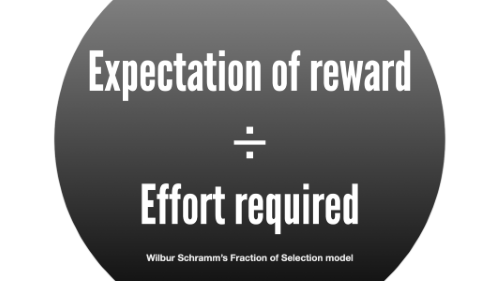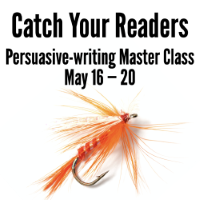Increase expectation of reward; reduce effort required
Your readers are bombarded with the data equivalent of 174 newspapers, ads included, every single day, according to a study by USC’s Annenberg School for Communication.

In this environment, how do they decide what to read?
Ask Wilbur Schramm.
Communication theorist Schramm created his Fraction of Selection formula to answer that question, “How do readers select the tiny fraction of all of the information they receive each day to actually read?”
According to Schramm, this formula flits through readers’ minds as they contemplate that stack of information: Expectation of reward divided by effort required.

It’s “What will I get out of this message?” vs. “What do I have to put into it?”
Your readers are just like you. In reading and in life, we’re looking for more gain, less pain.
For instance, I’d love to have the body of Beyonce. However, I’d like to accomplish this on an all-Twix bar diet. I don’t want to work very hard at it.
Your readers want to get the most out of your message while spending the least amount of time and effort on it. So:
- When you increase the gain, or reward, of reading, you’ll increase readership.
- When you reduce the pain, or effort required, of reading, you’ll increase readership.
- When you do both of these things at the same time, you’ll really dramatically increase readership.
To apply this formula to our own work, the first thing we need to ask is, “What are the rewards of reading?”
Increase the rewards of reading.
So what makes readers feel like reading? Draw readers into your message with:
- Information I can use to live my life better. Does your piece help readers make money, save money or get a Beyonce body while sitting on the couch eating Cheez Whiz from the jar with a spoon? That’s information they can use to live their lives better.
- Entertainment. Are you using creative techniques like human interest, metaphor or storytelling to bring your story to life? Are you making readers laugh, cry or shoot Diet Coke across the room from their noses? Make your message interesting to read.
We have now exhausted all of the benefits of reading. That’s it. Information I can use to live my life better and entertainment are the only tools you have to draw readers into our message. (Of course, you could always do both at the same time!)
Reduce the effort required.
But no matter how much you increase the reward of reading, your results get slashed by how hard it is to read. So to keep readers from running screaming from the room when they contemplate your message, you need to work both sides of Schramm’s equation. You must also reduce the effort required.
That means you’ll need to Cut Through the Clutter and Lift Ideas Off the Screen.
How do you write messages that readers want to read?
If you want to Catch Your Readers, you need to think like a reader. Then you need to use the bait your reader likes, not the bait you like.
 So what’s the bait the reader likes?
So what’s the bait the reader likes?
Learn a four-step process for making your message more relevant, valuable and rewarding to your audience at Catch Your Readers, our persuasive-writing workshop starting May 16.
There, you’ll learn the formula readers use to determine which messages to read. Discover two rewards you can use to boost audience interest in your message. And learn a magic word that focuses reader attention on your message.
Save up to $100 with our group discounts.
